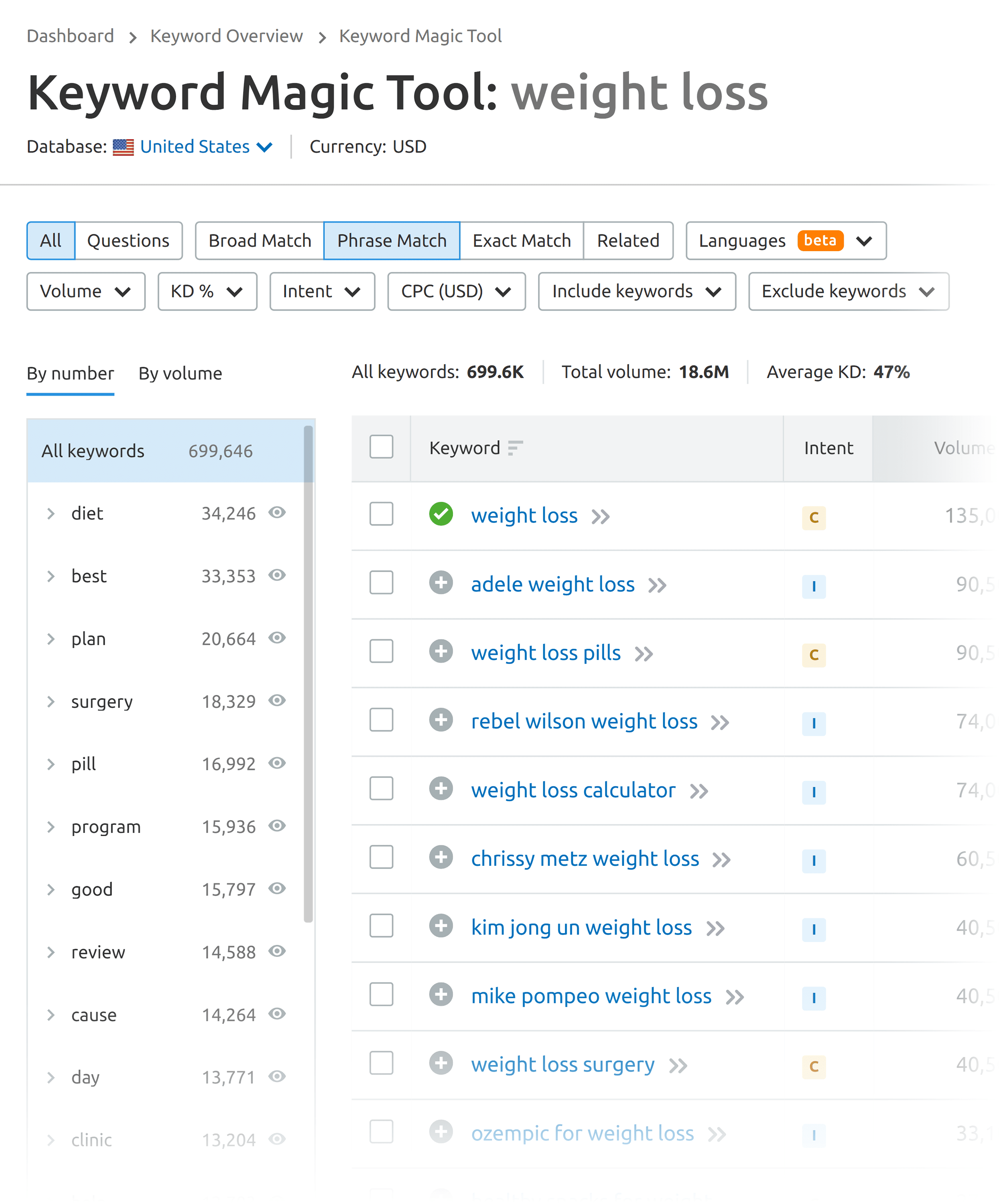Find the Perfect Keywords to Elevate Your SEO Strategy
The best keyword research tool is Ahrefs. It offers comprehensive data and user-friendly features.
Keyword research is crucial for successful SEO strategies. Ahrefs excels in providing accurate keyword data, search volume, and difficulty scores. It helps identify high-performing keywords, analyze competitors, and optimize content. The tool’s user-friendly interface makes it accessible for beginners and experts alike.
Ahrefs’ extensive database and reliable metrics ensure precise insights for effective content planning. Whether for blogs, websites, or e-commerce, using Ahrefs can significantly boost search engine rankings. Its additional features, such as backlink analysis and rank tracking, further enhance its utility. Investing in a robust keyword research tool like Ahrefs can lead to better online visibility and traffic.
Introduction To Keyword Research
Keyword research is a cornerstone of SEO. It helps people find the words they use to search online. Using the right keywords can boost your website’s visibility. This process is essential for attracting targeted traffic.
Importance Of Keywords
Keywords are the words and phrases that people type into search engines. They connect searchers with the content they seek. If your website uses the right keywords, it can rank higher on search engine results pages (SERPs).
Consider these points to understand the importance of keywords:
- Increased Traffic: Keywords bring more visitors to your site.
- Better Conversion Rates: Relevant keywords attract more potential customers.
- Competitive Edge: Good keywords help you stay ahead of competitors.
Seo Basics
SEO stands for Search Engine Optimization. It involves optimizing your website so that it ranks better in search results. The goal is to make your site more appealing to search engines.
Here are some basic SEO steps:
- Keyword Research: Find the right keywords to use.
- On-Page SEO: Optimize content and meta tags.
- Technical SEO: Improve website speed and mobile-friendliness.
Using a good keyword research tool can simplify these steps. It helps identify the best keywords for your content.

Credit: backlinko.com
Choosing The Right Tool
Finding the best keyword research tool can be a game-changer for SEO. The right tool helps you identify high-performing keywords. These keywords can drive traffic to your site.
Factors To Consider
Several factors can help you choose the best tool:
- Ease of Use: The tool should be simple and intuitive.
- Keyword Suggestions: The tool should provide a large list of keywords.
- Search Volume: It should show how often keywords are searched.
- Competition Analysis: The tool should offer insights into keyword competition.
- Accuracy: The data provided should be reliable and up-to-date.
Budget And Pricing
Costs vary widely among keyword research tools. Here is a quick comparison:
| Tool Name | Free Version | Monthly Cost |
|---|---|---|
| Google Keyword Planner | Yes | Free |
| Ahrefs | No | $99+ |
| SEMrush | Yes | $119+ |
| Ubersuggest | Yes | $29+ |
Free tools are great for beginners. Paid tools offer advanced features. Choose based on your budget and needs.
Top Keyword Research Tools
Finding the right keyword research tool can boost your SEO efforts. Here are the top keyword research tools you should consider.
Semrush
SEMrush is a popular choice for many SEO experts. It offers a comprehensive suite of features that include:
- Keyword research
- Competitor analysis
- Backlink tracking
- Site audits
SEMrush also provides a keyword difficulty score. This helps you understand how hard it is to rank for a particular keyword. With this tool, you can also discover long-tail keywords. These can be easier to rank for and can drive targeted traffic.
Ahrefs
Ahrefs is another powerful tool for keyword research. It is known for its extensive backlink database. Ahrefs offers the following features:
- Keyword explorer
- Content gap analysis
- Rank tracking
- Site explorer
The Keyword Explorer tool in Ahrefs is very effective. It provides keyword suggestions along with search volume and keyword difficulty. Ahrefs also shows you the top page ranking for your keyword. This can help you understand your competition better.
Google Keyword Planner
Google Keyword Planner is a free tool by Google. It is designed for advertisers but can be useful for SEO as well. Key features include:
- Keyword Suggestions
- Search volume data
- Cost-per-click estimates
The tool is very straightforward to use. Simply enter a keyword or a website URL, and you will get a list of related keywords. Google Keyword Planner is ideal for beginners who need basic keyword insights.
Features To Look For
Choosing the best keyword research tool can greatly impact your SEO strategy. It’s important to focus on specific features that make these tools effective. Below, we will discuss the key features to look for in a keyword research tool.
Search Volume
Search volume indicates how often a keyword is searched. It helps you understand the popularity of a keyword. High search volume means more potential traffic. Look for tools providing accurate monthly search volume data. This helps in targeting the right keywords for your content.
Keyword Difficulty
Keyword difficulty shows how hard it is to rank for a keyword. Tools should offer a clear difficulty score. It helps you choose keywords you can realistically rank for. Lower difficulty scores are easier to rank for, while higher scores are more challenging. This feature is vital for creating effective SEO strategies.
Competitive Analysis
Competitive analysis helps you understand your competition. It shows who is already ranking for your target keywords. This feature provides insights into their strategies. Tools should offer competitor keyword data, backlink analysis, and domain authority scores. These insights help you develop a better strategy to outrank your competitors.
| Feature | Importance |
|---|---|
| Search Volume | Helps identify popular keywords |
| Keyword Difficulty | Shows ranking challenges |
| Competitive Analysis | Provides competitor insights |
- Search Volume: Understand keyword popularity
- Keyword Difficulty: Assess ranking feasibility
- Competitive Analysis: Gain competitor insights
Advanced Keyword Strategies
Advanced keyword strategies help you optimize your content for search engines. Using advanced techniques can boost your website traffic. Two critical strategies are long-tail keywords and LSI keywords.
Long-tail Keywords
Long-tail keywords are longer and more specific keyword phrases. They usually have lower search volumes. But they often bring in highly targeted traffic. These keywords are less competitive.
For example:
| Short-Tail Keyword | Long-Tail Keyword |
|---|---|
| shoes | best running shoes for flat feet |
| laptops | affordable gaming laptops under $500 |
Using long-tail keywords helps you rank higher in search engines. They match specific queries users search for. You can use tools like Google Keyword Planner to find long-tail keywords.
Lsi Keywords
LSI keywords stand for Latent Semantic Indexing keywords. These are related terms search engines use to understand content. They add context to your primary keywords.
For example, for the keyword “apple,” LSI keywords might include:
- fruit
- orchard
- apple pie
Using LSI keywords in your content can improve its relevance. This helps in better rankings and provides a richer user experience. Tools like LSIGraph can help you find LSI keywords.
Incorporate long-tail and LSI keywords into your content. These advanced keyword strategies can boost your SEO efforts.

Credit: startuptalky.com
Integrating Keywords Into Content
Integrating keywords into content is essential for effective SEO. Keywords help search engines understand your content. They also improve your site’s visibility and ranking. Below, we discuss how to integrate keywords using On-Page SEO and Content Optimization.
On-page Seo
On-page SEO involves optimizing each webpage to rank higher. This includes using keywords in specific places:
- Title Tag: Place primary keywords at the beginning.
- Meta Description: Use keywords naturally. Keep it compelling.
- Headings: Include keywords in H1, H2, and H3 tags.
- URL: Keep URLs short. Include primary keywords.
- Content: Use keywords in the first 100 words.
Proper keyword placement improves search engine understanding. It also enhances user experience. Your content becomes more relevant.
Content Optimization
Content Optimization focuses on making your content valuable and keyword-rich. Follow these steps:
- Keyword Density: Maintain a keyword density of 1-2%. Overuse leads to keyword stuffing.
- Synonyms and LSI Keywords: Use synonyms and Latent Semantic Indexing (LSI) keywords. This makes your content rich and varied.
- Internal Linking: Link to other pages on your site. Use keyword-rich anchor text.
- Multimedia: Add images, videos, and infographics. Use keywords in alt tags and file names.
- Content Length: Longer content often ranks better. Aim for 1,000 words or more.
By optimizing content, you make it more engaging. This keeps readers on your site longer. It also improves your search engine ranking.
Tracking And Analytics
In the world of SEO, tracking and analytics are crucial. They help you understand how your keywords perform. A good keyword research tool should have strong tracking and analytics features.
Measuring Success
Measuring success means knowing which keywords bring traffic. A good tool shows this data. It helps you see which words work best. The data should be easy to read and understand.
- Keyword performance
- Traffic sources
- Conversion rates
These metrics are essential for your SEO strategy. They tell you what is working and what is not. This information helps you make informed decisions.
Adjusting Strategies
Adjusting strategies is vital for ongoing success. The data from the tool helps you see trends. You can spot which keywords need improvement. You can also find new growth opportunities.
- Identify underperforming keywords
- Replace them with better options
- Monitor new keywords for performance
A keyword research tool should allow easy adjustments. It should offer suggestions based on data. This helps you stay ahead of the competition.
| Metric | Importance |
|---|---|
| Keyword performance | High |
| Traffic sources | Medium |
| Conversion rates | High |
Using these metrics, you can refine your SEO efforts. This keeps your website relevant and competitive. Always use a tool that provides detailed tracking and analytics.

Credit: www.shoutmeloud.com
Future Trends In Keyword Research
Keyword research is evolving. Traditional methods are no longer enough. Future trends are reshaping this critical SEO task. Let’s explore the future of keyword research.
Voice Search
Voice search is growing fast. People speak differently than they type. This changes keyword research strategies. Long-tail keywords become more important. Natural language processing helps. Tools now focus on conversational queries.
Consider these points for voice search:
- Use questions like “how” and “why”.
- Optimize for local search terms.
- Include long-tail, conversational phrases.
Voice search is crucial for local businesses. People ask for nearby services. Your strategy must adapt to these new patterns.
AI and Machine Learning
AI and machine learning are transforming keyword research. These technologies offer smarter, faster insights. They analyze vast amounts of data. They predict trends and user intent.
AI tools provide:
- Automated keyword suggestions.
- Competitor analysis.
- Content gap identification.
Machine learning helps in understanding user behavior. It tailors keyword strategies accordingly. This leads to more effective SEO campaigns.
AI-powered tools also help in clustering keywords. They group similar terms. This improves content relevance. It enhances user experience and boosts rankings.
| Feature | Voice Search | AI & Machine Learning |
|---|---|---|
| Keyword Type | Conversational, Long-tail | Predictive, Data-driven |
| Focus | Natural language, Local search | User behavior, Trend analysis |
| Tool Capabilities | Speech recognition, Question-based queries | Automated suggestions, Competitor insights |
Frequently Asked Questions
What Is The Best Keyword Research Tool?
The best tool varies, but Ahrefs, SEMrush, and Google Keyword Planner are top choices.
How Does Keyword Research Work?
It involves finding popular search terms users enter into search engines to optimize content.
Why Use A Keyword Research Tool?
These tools help identify high-traffic keywords, improve SEO, and boost website rankings.
Can Keyword Tools Improve Seo?
Yes, they provide valuable insights into keyword performance, helping to optimize content for better search rankings.
Are Free Keyword Tools Effective?
Free tools can be effective but often lack advanced features in premium versions.
Which Keyword Tool Is User-friendly?
Google Keyword Planner is user-friendly and ideal for beginners.
Conclusion
Choosing the best keyword research tool can boost your SEO strategy significantly. Each tool offers unique features to explore. Evaluate your needs and budget to find the perfect fit. Effective keyword research drives traffic and enhances your online presence. Invest time in selecting the right tool for long-term success.








